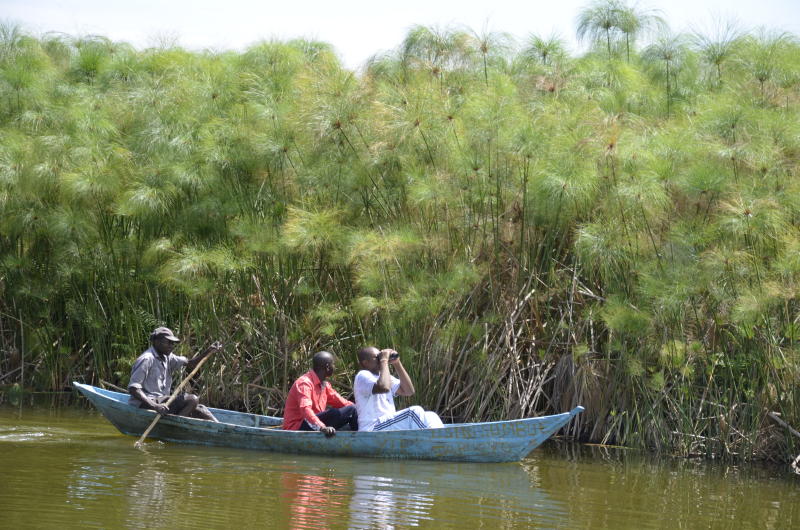A few days ago, as the year was coming to an end, my family and I decided to go for vacation in my home village and usually when we visit home, one of our main priorities is always to go and see our beautiful source of pride, Lake Kanyaboli or Nam Gangu as we nicknamed it.
Early in the year, we received a lot of news, morning ululations, and agony as people shouted Nam Dar! Nam Dar! (The lake is migrating) and since we were in the village we decided to go and take a look, on our way, there, we were embraced by a trail of heartbreaks from fishermen and farmers where floods from the lake had caused havoc, wreaked crops, and swept away domestic animals and even from the feel of the air, one could just tell that something is not right.
Nam Dar! Was a peculiar turn of phrase in everybody’s lips that took a momentary pause for me to comprehend, that the lake had burst its banks and was overflowing fast. The impact revealed staggering losses that crossed over to Busia County and we were also visited with the current Busia governor Dr. Paul Otuoma who promised to join hands with the Siaya county government to help combat the problem.
We were all grieving and heartbroken and as the son of the soil, it struck me with shock to see our lake and fish leaving, as I remembered vividly my childhood, how we used to practice our acrobatics and swimming strokes covered in nothing but our birthday suits. The lake has delicious and rare species of fish.
In recent years, the place has attracted the rich and the famous. Speed boats have been introduced with the erection of big hotels and resorts around the lake, which is surrounded by papyrus and other types of vegetation and occasionally we could also see a moving island, the lake provided sanctuary to many animals and birds, some of which are in danger of extinction.

Lake Kanyaboli is the Largest Ox-bow lake in Kenya and the second largest in Africa it was formed after river Yala disconnected and changed its course at the meander stage leaving a u-shaped lake with a variety of fish species that almost disappeared from Lake Victoria, the likes of Monye (Kamongo); ong’ala (mudfish); Ngege(Tilapia); Ochilo and some of which I cannot translate their names to English.
Lake Kanyaboli has been a source of livelihood to the communities that surround it, Gangu Ninga, Gangu Nyalaji, Kanyaboli, Kadenge, Ndai, Hawinga, Unyolo, and a source of irrigation to Dominion farms and Lake Agro Limited. This Lake has been our identity and a source of pride whenever I brag to my friends. So, when the lake broke its dyke and started rushing out my heart broke and my body froze, just standing there doing nothing and wishing that there was something that I could do. The ferocious force of nature or human trigger carried on for several days.
Have you ever visited your loved ones in the hospital and found them gasping for air? That is how I felt when I visited the lake during the December holidays, emptiness, hopelessness, and uselessness. I have heard of lakes drying up, others disappearing but I have never witnessed it happening literally. The blame usually goes to global warming with its diverse effects associated with climate change but between you and me, we both know that it is some result of human activities.
There were a lot of whispers and conspiracy theories on whether it was a punishment from the Supreme Being, climate change, or the workmanship of the dyke. And please let nobody sell you a story that since the lake had no outlet, hence the overflow, that is bullshit for lack of a better word. These kinds of disasters are usually responses caused by recent human activities like drilling in the vicinity and if the human efforts are successful in retaining the water, it usually comes back salty and with no fish at all after being affected by the mines, minerals, and the chemicals that were extracted from the place.
The solution to this problem needs proper planning, resources, and studies to come up with a blueprint that is going to permanently change this environment positively and ensure that nothing like this ever happens again. Human activities nearby are restricted bearing in mind that this lake has taken many to school and without it, the locals’ lives will be facing a bleak future.
The inundation of communities, displacement of homes, and compromised sanitation posed a significant risk of viral diseases. With submerged large areas, there was growing concern of the emergence of waterborne diseases and this includes viral diseases as well. So, if the County government could join forces with the National government and act fast on this issue it would be good. Put health clinics on alert ready to respond quickly for any uptick, and build business around to improve the economy of the area.
 The focus should extend beyond discussions to tangible actionable solutions, and allow people from different cultural diversities to bring innovative measures that align with the current economic development. We should also extend to developed countries and request them to pour in funding and technological expertise necessary for a long-term solution.
The focus should extend beyond discussions to tangible actionable solutions, and allow people from different cultural diversities to bring innovative measures that align with the current economic development. We should also extend to developed countries and request them to pour in funding and technological expertise necessary for a long-term solution.
In the face of Africa’s current flood crisis and the looming spectra of climate change, the call for collective action has never been so urgent. The private sector, religious institutions, civil organizations, and individual citizens should all dig in to make a difference that will birth a resilient future.
Philip Opiyo,
Office Assistant & Librarian – JHIA




